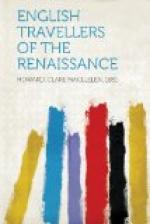We have perhaps said enough to indicate roughly the sources of the Renaissance fashion for travel which gave rise to the essays we are about to discuss. The scholar’s desire to specialize at a foreign university, in Greek, in medicine, or in law; the courtier’s ambition to acquire modern languages, study foreign governments, and generally fit himself for the service of the State, were dignified aims which in men of character produced very happy results. It was natural that others should follow their example. In Elizabethan times the vogue of travelling to become a “compleat person” was fully established. And though in mean and trivial men the ideal took on such odd shapes and produced such dubious results that in every generation there were critics who questioned the benefits of travel, the ideal persisted. There was always something, certainly, to be learned abroad, for men of every calibre. Those who did not profit by the study of international law learned new tricks of the rapier. And because experience of foreign countries was expensive and hard to come at, the acquirement of it gave prestige to a young man.
Besides, underneath worldly ambition was the old curiosity to see the world and know all sorts of men—to be tried and tested. More powerful than any theory of education was the yearning for far-off, foreign things, and the magic of the sea.
* * * * *
CHAPTER II
THE HIGH PURPOSE OF THE ELIZABETHAN TRAVELLER
The love of travel, we all know, flourished exceedingly in the reign of Queen Elizabeth. All classes felt the desire to go beyond seas upon
“Such wind as scatters
young men through the world,
To seeke their fortunes farther
than at home,
Where small experience growes."[36]
The explorer and the poet, the adventurer, the prodigal and the earl’s son, longed alike for foreign shores. What Ben Jonson said of Coryat might be stretched to describe the average Elizabethan: “The mere superscription of a letter from Zurich sets him up like a top: Basil or Heidelberg makes him spinne. And at seeing the word Frankford, or Venice, though but in the title of a Booke, he is readie to breake doublet, cracke elbowes, and overflowe the roome with his murmure."[37] Happy was an obscure gentleman like Fynes Moryson, who could roam for ten years through the “twelve Dominions of Germany, Bohmerland, Sweitzerand, Netherland, Denmarke, Poland, Italy, Turkey, France, England, Scotland and Ireland” and not be peremptorily called home by his sovereign. Sad it was to be a court favourite like Fulke Greville, who four times, thirsting for strange lands, was plucked back to England by Elizabeth.




